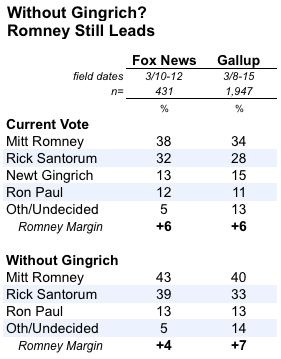With two second place finishes in Mississippi and Alabama last Tuesday casting doubt on Newt Gingrich’s southern strategy for winning the Republican presidential nomination, Newt once again is feeling pressure from social conservatives to drop out of the race – pressure to which he so far seems impervious. Many analysts (including myself) have assumed that Newt’s departure would benefit Rick Santorum – sentiment evidently shared by those heading the Santorum campaign. But as Stanford Professor Mo Fiorina cautions, that may not be the case. Two recent national polls lend credence to Fiorina’s warning. A Gallup Poll conducted March 8-15 with more than 1,900 Republican registered voters, including a sample of 290 Gingrich supporters found that Gingrich’s departure would have almost no impact on Romney’s polling lead over Santorum, which now stands at 6%, 34%-28%. With Gingrich gone, Romney’s lead actually grows to 7%. This is because Gingrich supporters are almost evenly split as to their second choice candidate between Romney and Santorum. A Fox News survey of 912 registered voters conducted March 10-12 comes to essentially the same conclusion; although it didn’t ask Gingrich supporters who their second choice was, it did survey respondents regarding their preferences if Gingrich was out of the race. In that case, Romney’s lead over Santorum decreased by 3%, from 40%-33% to 43%-39%. Mark Halperin conveniently summarizes the two polls at Pollster.com:

At first glance, this suggests Santorum might actually prefer that Newt stays in the race. Keep in mind that at this stage of the nomination fight, with almost half the delegates allocated, it is increasingly clear that, as Gingrich openly acknowledged, neither he nor Santorum are likely to finish ahead of Romney in the delegate race. That means their best chance of securing the nomination is to prevent Romney from reaching the 1,144 mark before the convention. Put another way, Santorum’s highest priority is not to win delegates so much as it is to stop Romney from doing so. This is where the Republican delegate allocation rules become crucial. In some primary states, such as New York, candidates clearing the 50% threshold win all the statewide delegates, and the same holds for congressional districts. If no one clears the 50% threshold, however, the delegates are allocated proportionally. In these states, many of which Romney will likely win, it is probably in Santorum’s interest for Gingrich to stay in the race in order to prevent Romney from clearing the winner-take-all 50% threshold.
Of course, much depends on whether we can trust the national polls at this stage of the contest. In 2008, many Clinton supporters vowed they would never back Obama if he won the nomination, but survey evidence suggests they did. How much of the current polling results indicating half of Gingrich supporters would back Romney, and not Santorum, reflects a similar dynamic? Maybe Gingrich supporters are responding strategically, in the belief that Santorum is their candidate’s main rival? Maybe more than half – much more – would back Rick if Newt was out?
But the situation is even more complicated. Note that some states, such as California, allocate delegates on a winner-take-all plurality basis largely by congressional districts. If Gingrich is taking more votes from Santorum, even slightly, than he is from Romney, Santorum would then benefit in these states by Gingrich’s withdrawal since it would increase the probability that Rick would finish ahead of Romney in at least some congressional districts. Still other states, such as Connecticut, allocate delegates statewide on a winner-take-all 50% threshold, but do so on a simple plurality winner-take-all basis within congressional districts. Presumably here Santorum’s best interest depends on where the most delegates reside – statewide or in the congressional districts.
To summarize, to the extent that delegates are awarded on a proportional basis, it probably helps Rick for Newt to stay in the race, in order to prevent Romney from reaching the winning majority. But as I hope I’ve demonstrated, it isn’t always clear that Newt’s presence helps Rick – in some cases it may help Romney. Presumably Santorum’s staff is working out the delegate math on a state-by-state basis. Of course, we can’t be sure how Newt is going to do in some of these states. His support may be so low as to be relatively inconsequential no matter how delegates are allocated. All of which makes projecting the delegate math even more complicated.
Should Newt stay, or should he go? Like all relationships, it’s complicated. However, the issue may be moot; as of this writing, Newt is showing no inclination of packing his toothbrush.
By the way, I have a short piece addressing this issue at this U.S. News Debate Club exchange. If you care to join in, you can strike a blow for political science.
